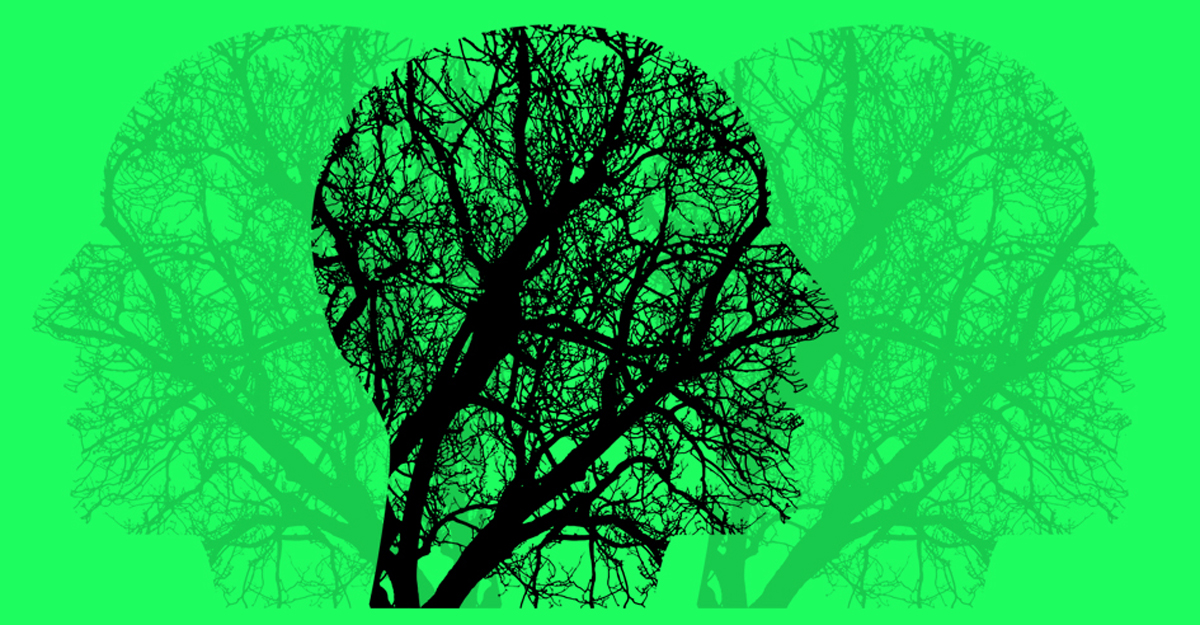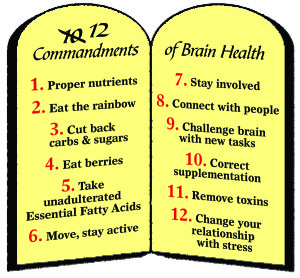
Healthy Brain Holistically
By Mark J Kaylor
Every September health magazines and natural products journals all send out requests for articles on brain health. The reason is, of course that September marks the beginning of a new school year. However there is a huge fallacy buried in this logic that once school starts we need to be more attentive to our brain’s health, vitality, and functioning. The simple truth is that our brain’s health and ability to do its thing is much more dependent on how we have lived and eaten over the last years or even decades rather than what we did yesterday. Multiple studies performed over the last decade or two have all confirmed that what is possibly the most serious of brain disorders, Alzheimer’s disease, actually starts to develop decades in advance of any notice or diagnosis. The same is true to a large degree even for healthy brain functioning on a day-to-day basis. For these reasons this article will attempt to approach maximizing our memory and cognitive abilities from a more holistic point of view.
WHY HOLISTICALLY
What we know about brain function and health is dramatically changing and evolving literally on a weekly basis; and while many in our society and in more conventional medical practice still look at “holistic” a bit cross-eyed, I strongly believe it is the best approach for our overall health and especially when it comes to our brain. This conclusion is not based upon assumptions but rather on many, many studies and papers exploring brain health. The evidence shows that long-term brain health is dependent upon the harmonious functioning of a number of systems within the body, including chronic inflammation, insulin sensitivity, oxidative stress, endocrine or hormonal balance, immune function, detoxification, and endothelial function. The obvious lesson here is that if you want a healthy brain, build a healthy body – and the best way to do this is holistically. (See: 12 Commandments of Brain Health)
PUSHING THE ENVELOPE
On this next point I am pushing the envelope a bit and challenging current thought. It is widely accepted as a truth in Western medicine and research that the brain naturally declines with age. This I believe will eventually fall to the wayside just as mainstream “science” used to believe that nerve cells could not and did not reproduce themselves. A point we now know is not true. I do not believe, nor do I think emerging research supports, this inevitability of cognitive decline with age. This decline is due to, more than anything, decades of a lifestyle and diet that is insufficient or detrimental to the optimal health of our brain. The good news here then, as I see it, is that there is so much we can do to prevent and reverse these declines and mental acuity, abilities, capabilities, and activities. (Enlarge Image)
While there are dozens, if not hundreds, of herbs, foods, nutrients, and other compounds that effect and support the brain this would require an encyclopedia. So what I offer you in this article are a handful of powerful suggestions to get you started on your path to a healthy brain with fully functioning memory. There are two somewhat overlapping levels that we need to include; one, substances that affect and support our brain functioning immediately, helping it to operate quickly and sharply, and two, allies to keep our aging brain young, maintaining our cognitive abilities and memory.
HELP IS ON THE WAY
Let’s begin with what may be the most impacting beneficial lifestyle choice you can make to maximize your brains ability; and that is, EXERCISE. And this may surprise you a little bit, while exercise for the brain is good, it now appears that exercise for the body may be even more impactful for our brain. One thing that physical activity does is that it raises levels of a protein (BDNF) that acts on the parts of the brain that involve memory, learning, new neuron creation, and neuron health. While strenuous activity demonstrates the most benefits, research suggests even low to moderate physical activity levels can significantly reduce risk of declining mental capabilities.
First up on my list of brain and memory supporting supplements is a new up and comer derived from the lion’s mane mushroom, called Amyloban. This clinically backed extract has demonstrated promising results in people suffering from Alzheimer’s and dementia. Researchers saw significant improvements in memory, functional independence, quality of life, mood, problem-solving, understanding, and communication. The research to date suggests benefits for prevention as well as therapeutically. My experience with this Lion’s Mane extract personally and in practice has been noticeable improvements in memory, quickness, and sharpness of mind in just a few days.
Ayurvedic medicine offers us three powerful brain supporting allies (and personal favorites); Bacopa, Ashwagandha, and Gotu kola that also work with the body in a holistic manner. Bacopa is an adaptogenic herb – supports stress relief, that also supports healthy liver functioning – which can aid the body’s detoxification processes. It supports regeneration of brain tissue, improves memory, helps consolidate memory, and improves brain-processing speed. Ashwagandha also helps the body deal with stress, particularly nervous exhaustion, while calming and strengthening the central nervous system as it helps improve recall. Gotu kola is a long used brain and nerve tonic that is said to promote mental clarity, emotional balance, enhance memory, and calm the central nervous system.
While everyone is probably familiar with ginkgo there are a few “new kids on the block” that show a range of promising benefits for supporting brain health, memory, and various neuro-degenerative diseases.
First up is Huperzine A, derived from the Chinese club moss. Hup A inhibits the enzyme acetylcholinesterase that breaks down choline thereby helping to maintain higher levels of the neurotransmitter acetylcholine. It makes for a nice study ally in that it is a good short-term memory enhancer and appears to work well in young adults. Next up is a derivative from the lesser periwinkle plant, called Vinpocetine. This compound up regulates energy production in brain cells, increases blood flow to the brain, and may enhance the brains use of glucose. The end result is a brain that is better nourished and better fed. Choline is a B vitamin that is key to optimizing brain function that supports both neuronal membrane health and neurotransmitter production. There is a specific form of choline called GPC, glyceryl-phosphorylcholine that may be better utilized by our brain. GPC may be more effectively utilized by our brain as a precursor to the neurotransmitter acetylcholine and may prevent loss of cholinergic receptors. This two-pronged benefit means there may be more messenger compounds along with more receivers of these compounds.
Special mention needs to be made of a powerful neuro-protective gift from of all places the beehive. Propolis, and more specifically Brazilian green Propolis, has demonstrated numerous benefits for brain health and in particular for protecting the brain from all too prevalent neurotoxins. Propolis works in this regard synergistically with both ginseng and fish oil. Ginseng itself has been shown to boost clearance of plaque buildup in the brain and in both animal and human studies to improve memory.
SO DOES ANY OF THIS REALLY WORK?
It’s easy to say “here, take this and this.” but does it really work? In a recent first of its kind study, 10 patients with varying degrees of cognitive impairment, including dementia, incorporated a supplement routine. Nine of these 10 saw improvements beginning within 3 to 6 months. Six patients, who had needed to discontinue working were actually able to return back to work. So to answer the question of whether or not the supplements can help us achieve and maintain a youthful, active, capable, highly functioning brain, I say a resounding “YES”. And I am suggesting that taking it further, including lifestyle adjustments that involve community, physical exercise, mental challenges, lowering stress responses, and proper nutrition along with the supplements can put us on a path for a brain that stays “young at heart”.
 Mark J. Kaylor has been exploring holistic health and healing for close to four decades. He is the founder and director of the not-for-profit Radiant Health Project. Mark welcomes you comments and questions and can be contacted at his website: www.RadiantHealthProject.com or on facebook at www.facebook.com/RadiantHealthProject
Mark J. Kaylor has been exploring holistic health and healing for close to four decades. He is the founder and director of the not-for-profit Radiant Health Project. Mark welcomes you comments and questions and can be contacted at his website: www.RadiantHealthProject.com or on facebook at www.facebook.com/RadiantHealthProject
Disclaimer: All information and results stated here is for educational and entertainment purposes only. The information mentioned here is not specific medical advice for any individual and is not intended to be used for self-diagnosis or treatment. This content should not substitute medical advice from a health professional. Always consult your health practitioner regarding any health or medical conditions.
